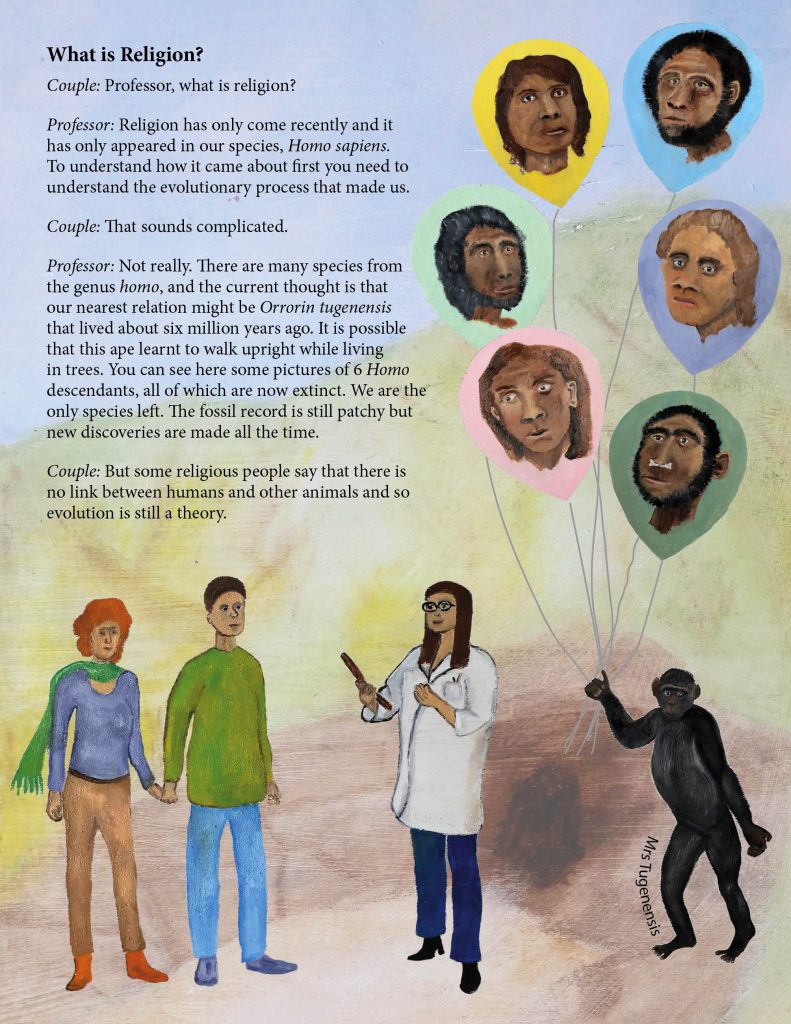
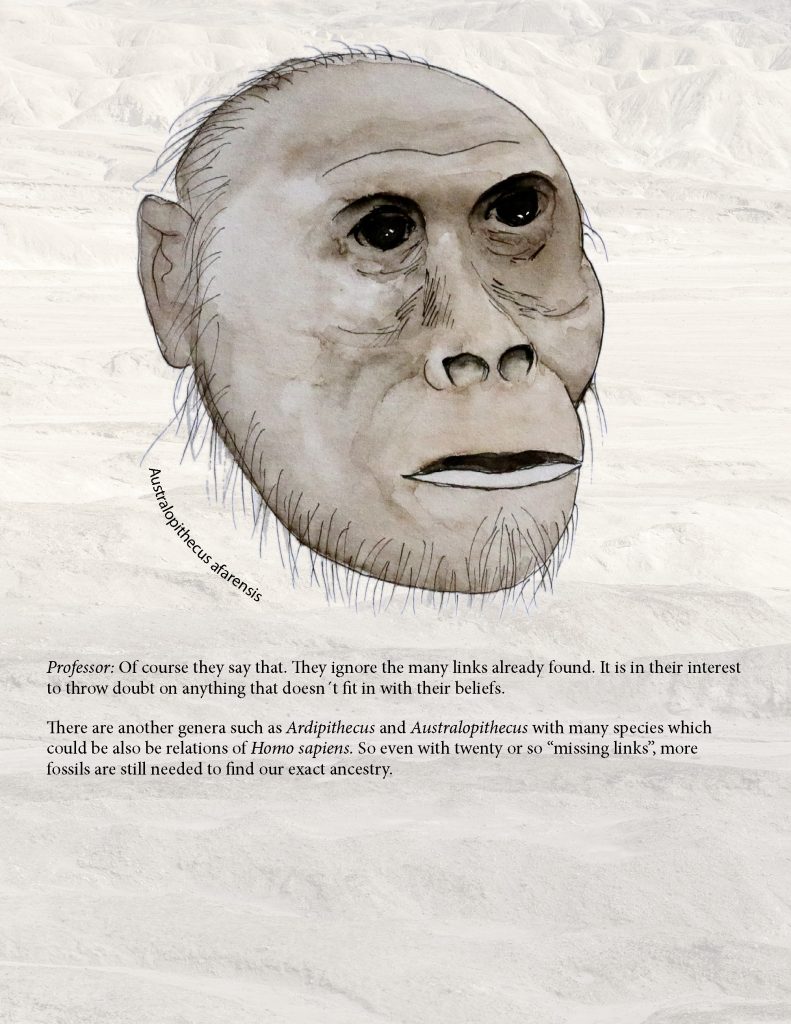
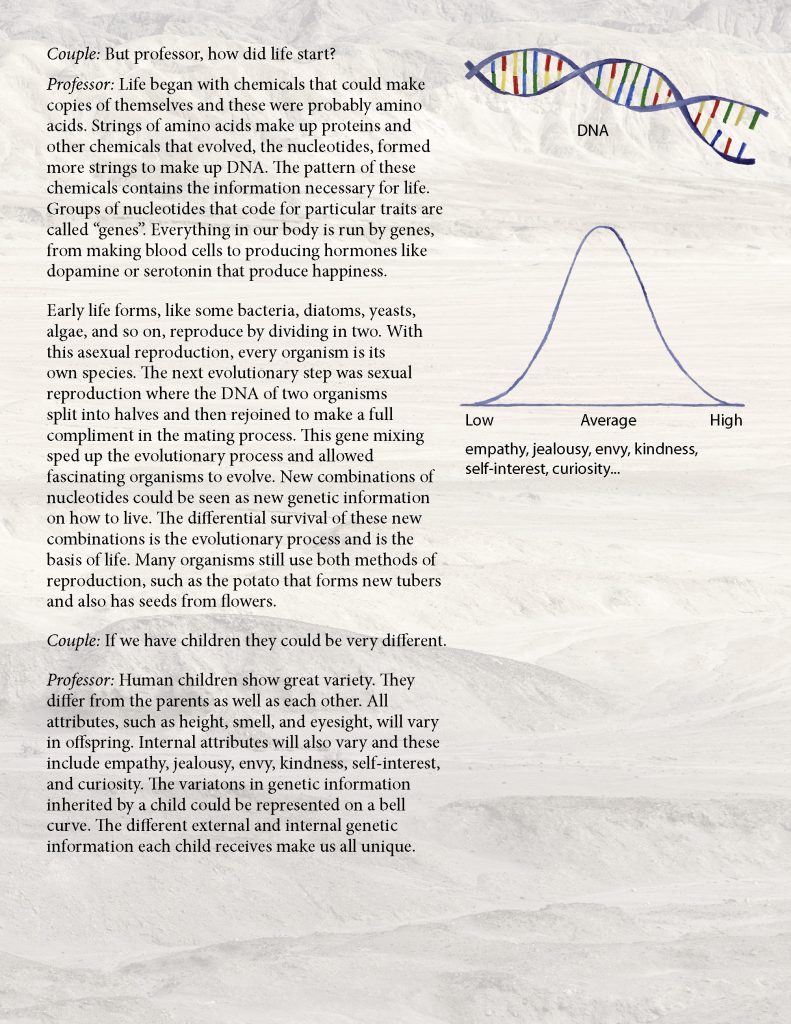
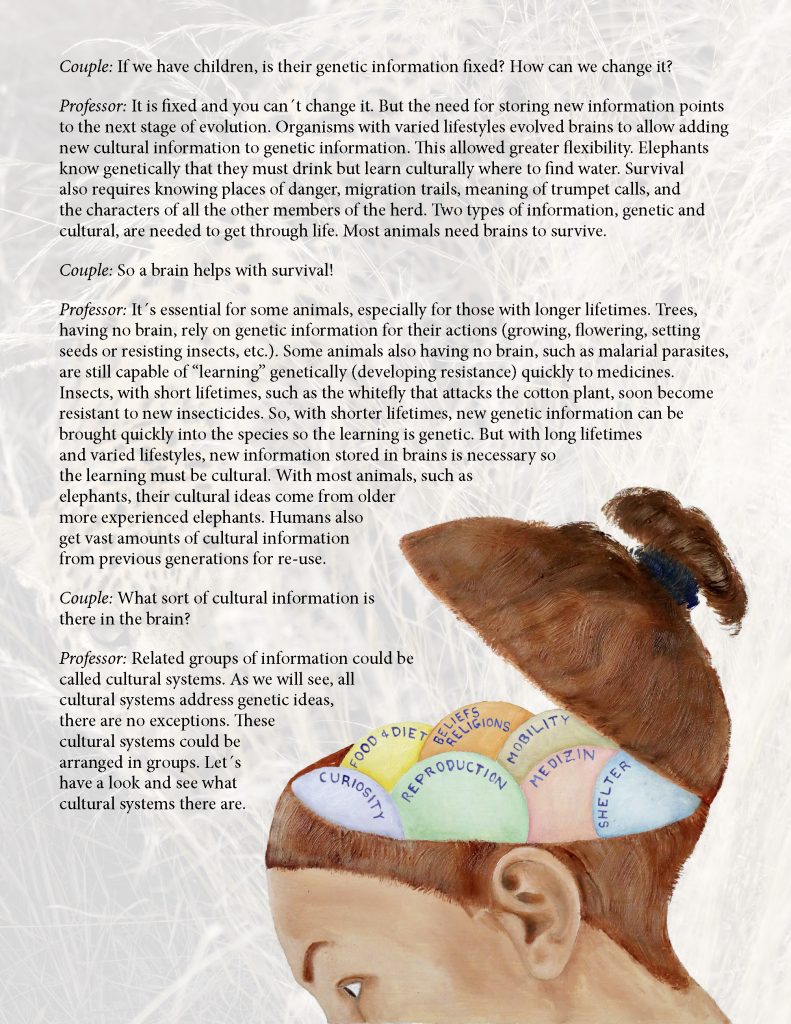
Professor: The purpose of cultural ideas is to assist with survival and eventually reproduction. Wild animals act to preserve their lives and, when in a position to do so, mate. If they don´t eat they feel hungry; if they don´t find shelter they feel cold or hot; if they mate they feel satisfaction; the genes use pleasure and pain to push the animal in which they are resident towards reproduction. The genetic reward is a hormonal wash in the brain with chemicals such as dopamine and serotonin. This is the origin of pleasure (happiness).
Pleasure and pain go hand in hand with reproduction in all animals with developed brains.
But in humans, where the volume of cultural information has become so vast, some cheating has started. This is best understood by example so let´s start with mobility. A genetic idea is movement and for this we evolved legs. Food can be collected and animals hunted. We have also evolved curiosity to explore and know our surroundings. Maybe there are new opportunities in the next valley? Movement and curiosity address genetic hunger so we can expect cultural systems to evolve that aid them. The first cultural idea for mobility was probably the canoe. Fishing could be done and the extra resources for the family unit helped with survival. Making a boat requires cultural ideas and this skill can be passed down through the generations. Mobility was further helped with the horse and cart, in turn followed by bicycles, cars and aeroplanes. Here new cultural ideas address the genetic idea of mobility and generally happiness is the reward from using these artefacts.
Cultural ideas for mobility also increased the chance to conquer other lands, such as the Vikings who used boats to expand overseas. Genghis Kahn used the cultural idea of riding a horse for his territorial ambitions. Here pleasure increased for some and decreased for others. Even today, there are tyrants that use the military, who rely on cars and trucks, to further their own interests at the expense of the general population.
For the modern human, the volume of cultural ideas for mobility has become so large that reproduction is interfered with. Today we have huge ocean cruisers that carry thousands of people who are wined and dined as they go around in a circle and eventually return to their original starting point. On these holidays people are not looking for extra resources to help their children survive. It is for the fun of travelling only. Travelling on the liner addresses many genetic ideas such as hunger (all meals provided), curiosity and socialisation but the main purpose is pleasure rather than reproduction. Many of the people on these liners have already had children, but for the young ones, if they limit the number of children they have in order to be able to afford expensive holidays, then their genes have been cheated. There are two interests here, a genetic desire for reproduction and a genetic desire for happiness. In elephants these interests are the same, in humans they are beginning to diverge. The ability of humans to put individual happiness over reproduction is a theme that will apply to many cultural systems below. It is what separates humans from the other animals: the ability to cheat the genes.
Couple: That´s a lot to digest. So transport originally aided reproduction but could now it could be reducing it. Are there other examples?
Professor: Today it applies to most cultural systems. Look at food. I don´t know when people started to cook food, but the use of fire is a cultural idea. Maybe a bushfire roasted an animal and it was found good eating. Anyway, cooking is a type of pre-digestion that helps break down food before it is eaten. It saves the body a lot of work. Some types of food can only be eaten after cooking. Boiling also sterilises food. Food can be preserved, dried or frozen. Cooking has many advantages and today the process has become so elaborate that it goes beyond just sustaining life. So important has food become to some people that they even fly in out of season produce from other countries. Cooking has become a sophisticated art with millions of books written about it. Many people eat at restaurants regularly and this lifestyle and the cost involved, like travelling on ocean cruisers, may lead to choosing to limit the number of children. If so, the genes have been cheated. The genes are giving the reward for eating tasty food but this is not leading to a larger family.
A similar logic also applies to shelter. Being too hot or too cold produces an uncomfortable feeling with the genes encouraging shelter. Trees and caves were the first shelters. Caves may also protect people from wild animals. But caves are not common and as the population increased it is only natural to try and make your own cave. Huts and houses followed. Shelter increased the chance of survival. The houses are cultural systems that address a genetic need. But today some people are building such huge houses that use all their income to run and so opt to have less or no children at all. If they had a smaller house and a reduced lifestyle, they would be able to support more children. The original purpose of the genes, to use pleasure/pain to direct people towards reproduction, is being undermined by expensive houses. Like resources being directed to travel and elaborate foods, elaborate houses might also reduce reproduction. Here the needs of the genes and the person diverge.
Couple: What about reproduction itself, surely that is only genetic and not cultural.
Professor: Condoms were used in China two thousand years ago. The Catholics encouraged the rhythm method where the woman was only meant to have sex when she was not ovulating and had little interest in it. Later there was the contraceptive pill. All are cultural ideas that address the genetic desire to reproduce. In these cases reproduction is reduced. From a genetic eye-view, those genes that produce the most copies of themselves are the most successful. Having a reduction of copies is a disaster for a gene. The genes reward mating with orgasm and staying together with love, and in exchange for these feelings, children are meant to be raised. But now, with contraceptives, people can weigh up the happiness of having children and some are choosing against having children. From a gene eye-view, this is going in the wrong direction. People can get the genetic rewards as if they had children but without the work and expense of children.
Couple: We haven’t thought about children, but I can see that there is a choice.
Professor: With the use of contraception a person gets the genetic reward but not the genetic consequence of children. In some countries couples are opting to have no children at all. This is not necessarily a bad thing and I am sure it is being helped by worry over the world´s population explosion. But the genes aren´t about kindness and fairness, their only object is reproduction. Some people are enjoying intimate relationships, travel, rich food and a big house in place of children. They are still rewarded by the genes as if they had produced children.
Couple: What about science and philosophy, are they cultural systems that address the genes?
Professor: Of course. Science is a product of curiosity and this varies between children as per bell curve. Curiosity increased our chance of survival in the past. It is only natural to wonder about the how the world works. Many ancient civilisations, like the Greeks and Arabs, had highly regarded philosophers to speculate on these sorts of questions. Science is the modern philosophy. Both science and religion are cultural systems that address genetic curiosity.
Couple: Is religion a type of philosophy?
Professor: It is a philosophy and also a cultural system and so religion must also address our genes. Homo Sapiens have taken countless years to evolve with the newly discovered Orrorin tugenensis now thought to a relative of some 6 million years ago. It´s hard to know when Homo sapiens became a species but it was probably about three hundred thousand years ago. Sculptures and ritual burials started to make appearances around thirty thousand years ago. This means we started religion in about the last ten percent of our existence. It is not clear what beliefs these early practices were. Such early beliefs could hardly have been sophisticated. Since then, thousands of religions have come and gone. Many more religions have become extinct than exist today. The first detailed religions appear to have been created in the last six thousand years. See the chart of some of the main religions. It is not exhaustive but gives a general idea of the many and varied beliefs. Many of the religions are exclusive, believing that they are the only correct ones.
Couple: But why the fish in the chart of religions?
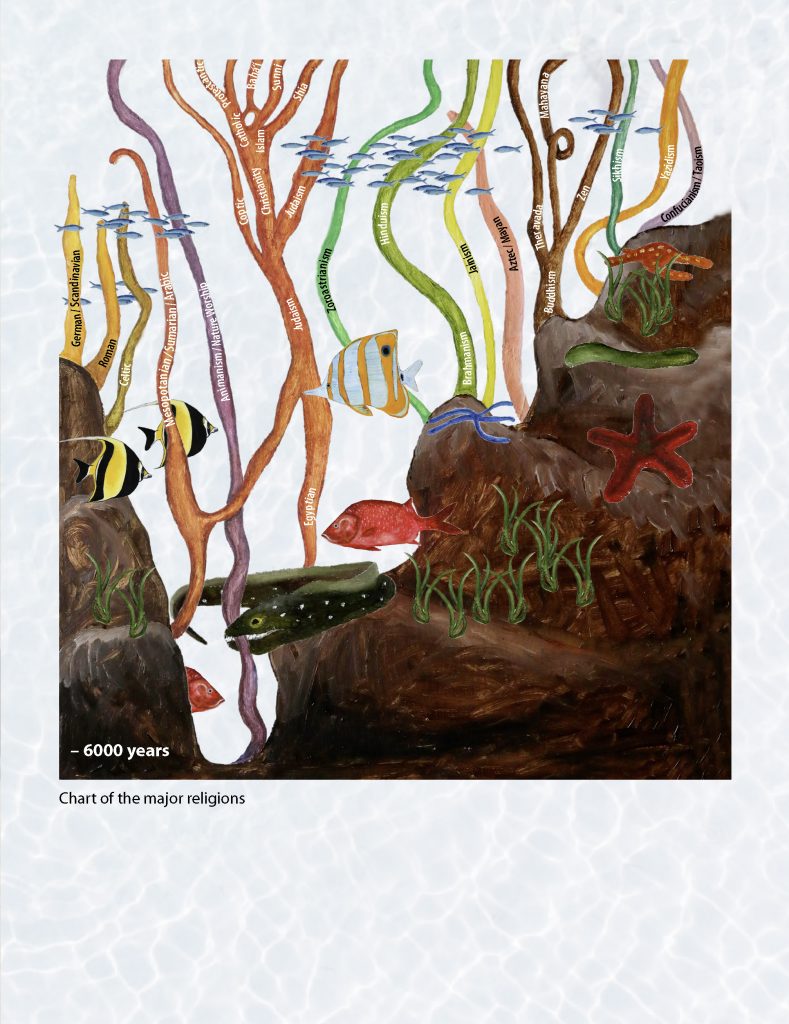
Professor: Fish were our ancestors too! We have come a long way on the evolutionary path. Fish also show curiosity. Curiosity started early on our evolutionary path. We are all born with a genetic curiosity and so we try to explain how the world came into existence. In these early days people believed all sorts of stuff like the world being flat and the sun and stars revolving around the earth. Heavenly bodies became mythological gods whose lives were intertwined with human events. Attempts to explain the world by various religions, like Genesis for example, were guesses on how the world worked. These early guesses are persistent and there are still people today who take these types of stories seriously.
Couple: That´s fairly sad. Don´t they see the countless fossils in the ground.
Professor: Their desire to believe is so strong that they look past these facts. When religions start, the ideas behind them don´t have to be true, they only have to be believed. Thousands of years ago people´s knowledge was small and almost no one could read and write. They were vulnerable and not in a position to argue over what they were told. If they didn´t take on the religion of the day they could be punished or even killed. What choice did they have? Most religions were forced onto people by pleasure and pain tactics. Even today, you can be killed for changing your religion in some countries. This is similar to the pleasure and pain of the genes to push people towards reproduction but on a cultural level.
Couple: But what genetic ideas did these religions address?
Professor: Religions also use the usual pleasure/pain method to keep followers. All religions address genetic ideas. There are no exceptions. In each person there is a genetic fear of death so some religions offer heavens or spiritual rebirths. Here the “soul” of a person doesn´t die. Many people believe this attractive idea. People like to feel special. But there are other ways of looking at “soul”. If we take “souls” as patterns of chemicals in the body, then the “genetic souls” are the genes passed to children and the “cultural souls” are the ideas of the parents and society passed to children. In this way there is a soul that persists. The religious “soul” is a metaphor for these two other types of soul as chemistry was not understood at the time.
Religions make people feel guilty by telling them they have original sin. In part this is true as every person is born with envy, jealousy, hate, aggression, kindness, love, and so on, all natural properties necessary in the struggle of existence that leads to reproduction. Some biologists refer to this as nature being “red in tooth and claw”. Aggressive, assertive or cunning people sometimes have a greater chance of reproduction. Our history shows that many dominant men took harems. “Original sin” is a metaphor used by religions as they didn’t understand the biology of aggression.
A monk once told me that he was full of God’s love for all the people of the world. I’m sure he was full of love, but this was genetic love that was meant for children and other relations. Without children, he had redirected this love onto non-related individuals but he still got the genetic reward as if he had loved his own children. People are hungry for genetic rewards and redirection is a common way to get it. A couple without children may adopt a child or a person may start an orphanage. In both cases the reward is genetic pleasure from nururing.
The genetic desire to socialise is also used in religion. Children naturally follow their parents and take on their beliefs. Socialisation is also aided by large spacious buildings and regular meetings. Music is often used to add ambience. Sermons are given which support the dogma of the religion.
Religions also address socialisation by making gods or saints your protectors and saviours. You are never alone in a religion. Icons, statues, pictures, and books keep you company. The bible has often been the only comfort for a lonely missionary. Even though you don´t know everything, God does, so in this indirect way, all is known. There are no mysteries left. By getting rid of mysteries, loneliness is reduced. Redirection is also common in religion. A common prayer starts with “my father who art in heaven” so even though your earthly father may die, there is another who cannot die and so will always be a comfort.
Couple: You make religions sound like comfort systems.
Professor: In a way they are. Like I said earlier, they are not about truth but about belief. Don´t join a religion looking for truth. They offer a way of life or system of thought that gives life meaning. Religions provided the only explanation before science. It was all people had. They had little choice, but with science we now have choice.
Couple: Maybe we would be happier being religious.
Professor: It´s possible. But if you want to understand the world, you have to push the dogma of religion aside. Religions are clearly a product of the human mind and particularly the male mind. All the important positions are male, the male is head of the family, and so on. So for a woman, most religions will always keep her a second class citizen. Men made god in his image. This flaw dosen’t help belief in religions.
If a person rejects religion, it will be necessary to say “I don´t know” to many things. Maybe life will not be as happy. Maybe believing in evolution and a physical world with a finite life (when the sun expires) is a more lonely option. It takes a certain amount of courage to try and see life as it really is.
Winfried Hoerr
evolution-path.com